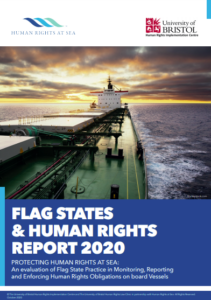While the maritime authorities have the main responsibility of ensuring the effectiveness of the flag States’ monitoring and reporting systems for human rights issues, these mechanisms are not always sufficiently implemented, a new report by British charity Human Rights at Sea shows.
This is according to the newly published ‘2020 Flag States and Human Rights Report: An evaluation of Flag State Practice in Monitoring, Reporting and Enforcing Human Rights Obligations on board Vessels’.
The University of Bristol (UK) Law School graduate and postgraduate researchers, in partnership with Human Rights at Sea, prepared the report as part of an established year-on-year joint research project with the University of Bristol’s Human Rights Implementation Centre and Human Rights Law Clinic.
This year, the project focused on three flag States, the UAE, India and Malta, whose public positions were independently reviewed and commented on in reference to the under-explored issue of flag State practice in respect to national and international human rights obligations.
The aim of the project was to reveal deficiencies in human rights protections and offer informed recommendations.
Key findings
Among the key conclusions is that there are varying highlighted mechanisms in place in each flag State to ensure a degree of monitoring and reporting of human rights issues that come to light.
According to the Paris MoU, Malta is listed as a White flag State, while India is listed as a Grey flag State. By contrast, the UAE is not party to the Paris or Tokyo MoUs.
While the maritime authorities have the main responsibility of ensuring the effectiveness of the flag States’ monitoring and reporting systems, the Report shows that these mechanisms are not always sufficiently implemented.
For instance, the report reads, the protection of seafarers on board UAE-flagged vessels often relies on media, welfare or NGO organisation reporting, rather than via available and promulgated state-level complaint mechanisms.
This is evidenced by the apparent failure of the UAE to meet the necessary requirements of the Paris or Tokyo MoU lists which suggests that more regular vessel inspections are needed.
Meanwhile, although there are, thus far, no reported human rights violations for the Malta flag State, there is room for improvement in terms of clear reporting and complaints mechanisms to be made available for seafarers, the authors suggest.
In addition, India’s performance has improved with each year by adopting appropriate policy measures in order to accomplish their aims of improving their reputation.
However, while there is a clear political willingness to do better, it is publicly difficult to identify the initiatives and mechanisms put in place to actually improve India’s records on reported human rights abuses at sea. The non-payment of wages and abandonment of seafarers are clearly the most pressing issues.
In sum, the report suggests that more public policy and legislative development is needed by all three flag States to better improve their working conditions on board vessels under their flag, and to ensure more effective transparent reporting and monitoring mechanisms are put in place.
MoU evaluations reflect compliance with human rights obligations to a limited extent. Thus, the monitoring and protection of human rights should become a priority and part of flag State day-to-day business.
Recommendations
The Project team make the following five recommendations:
- Ratifications. Flag States should ratify all core UN human rights treaties, IMO and ILO Conventions which provide for safety, human and labour standards. Further, a flag State needs to put in place mechanisms for the implementation of their human rights obligations and provide for individual complaint procedures.
- Publicly Available Information. Flag States need to improve the clarity of their websites, publish findings of investigations and ensure better access to information. Relevant information, reporting procedures and remedies should be made available online by each flag State.
- Reporting. Transparent and clear reporting mechanisms should be put in place that will allow persons on board vessels to complain of human rights abuses. If such mechanisms already exist, they need to be more accessible and user-friendly by regularly updating contact details online. Where no complaints mechanism is available, it is of utmost urgency to establish a point of contact for vulnerable seafarers in addition to established welfare organisations.
- Compliance. Compliance with human rights obligations on board vessels is a significant consideration that needs to be factored in the assessment of flag States under established MoU mechanisms. In cases where MoUs consider such factors, a clear explanation should be provided on how compliance with human rights obligations are measured and applied.
- Human Rights at Sea Policies. Respective Maritime Authorities such as the MMA, FTA and MMD should explicitly mention the focus on addressing issues relating to human rights at sea as a standardised policy position. Immediate improvements involve the authorities conducting an Annual Report on Human Rights at Sea which presents empirical studies on levels of human rights violations, policy positions, policy and legislative protections, and the results of all actions taken to provide remediation for victims.
Find more herebelow:

See also previous studies of other flag states:






























































